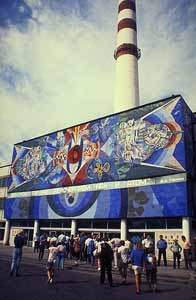
The system built to manage Russia’s nuclear legacy is crumbling, our new report shows
Our op-ed originally appeared in The Moscow Times. For more than three decades, Russia has been burdened with the remains of the Soviet ...
News

Publish date: November 14, 2000
Written by: Thomas Nilsen
News
The power plant is the main electricity provider in the St Petersburg region and their move is prompting grave warnings of blackouts as winter arrives in Northwest Russia. Interviewed by AP, Konstantin Ramburger, spokesman for the state-run Rosenergoatom, which operates Leningrad nuclear power plant, said the output from the three operating reactors would be reduced by 30 % this week. The fourth reactor is currently off-line, undergoing repairs. Some critics have been raised concerning the safety of the reactors. Environmentalists say the RBMK reactors are less stable when run at lower power.
Unified Energy Systems (UES) owe Leningrad nuclear power plant 2 billion rubles ($72 million). Rosenergoatom spokesman Ramburger says Leningrad NPP is just the first one to reduce its output in protests to the debts. Russia’s eight other nuclear power plants have not been paid for energy they generate as well, and they will also reduce output if UES does not pay soon, Ramburger said.
Simultaneously, Leningrad NPP officials stated at a St. Petersburg conference last week that the service life time of the first and second reactor can be extended for another decade on the average without any damage to the nuclear and radiation safety. Quoted by ITAR-TASS, general director of the plant, Mikhail Orlov said the safety of the reactors have been upgraded. More than $700 million will be invested in modernisation before 2005. Reactor units one and two are the oldest civilian RBMK reactors in the former Soviet Union, started up in 1973 and 1975.

Our op-ed originally appeared in The Moscow Times. For more than three decades, Russia has been burdened with the remains of the Soviet ...

The United Nation’s COP30 global climate negotiations in Belém, Brazil ended this weekend with a watered-down resolution that failed to halt deforest...

For more than a week now — beginning September 23 — the Zaporizhzhia Nuclear Power Plant (ZNPP) has remained disconnected from Ukraine’s national pow...

Bellona has taken part in preparing the The World Nuclear Industry Status Report 2025 and will participate in the report’s global launch in Rome on September 22nd.